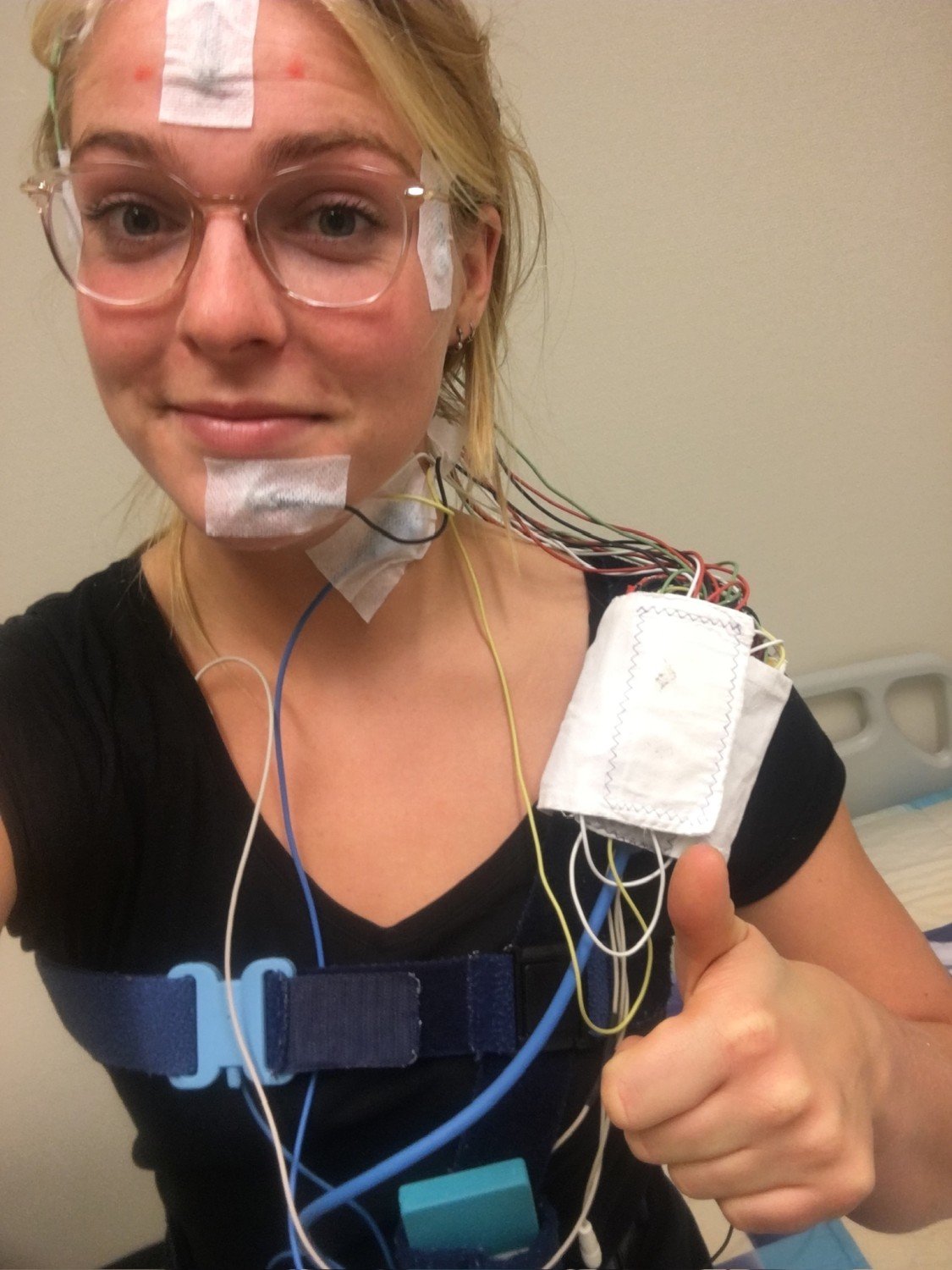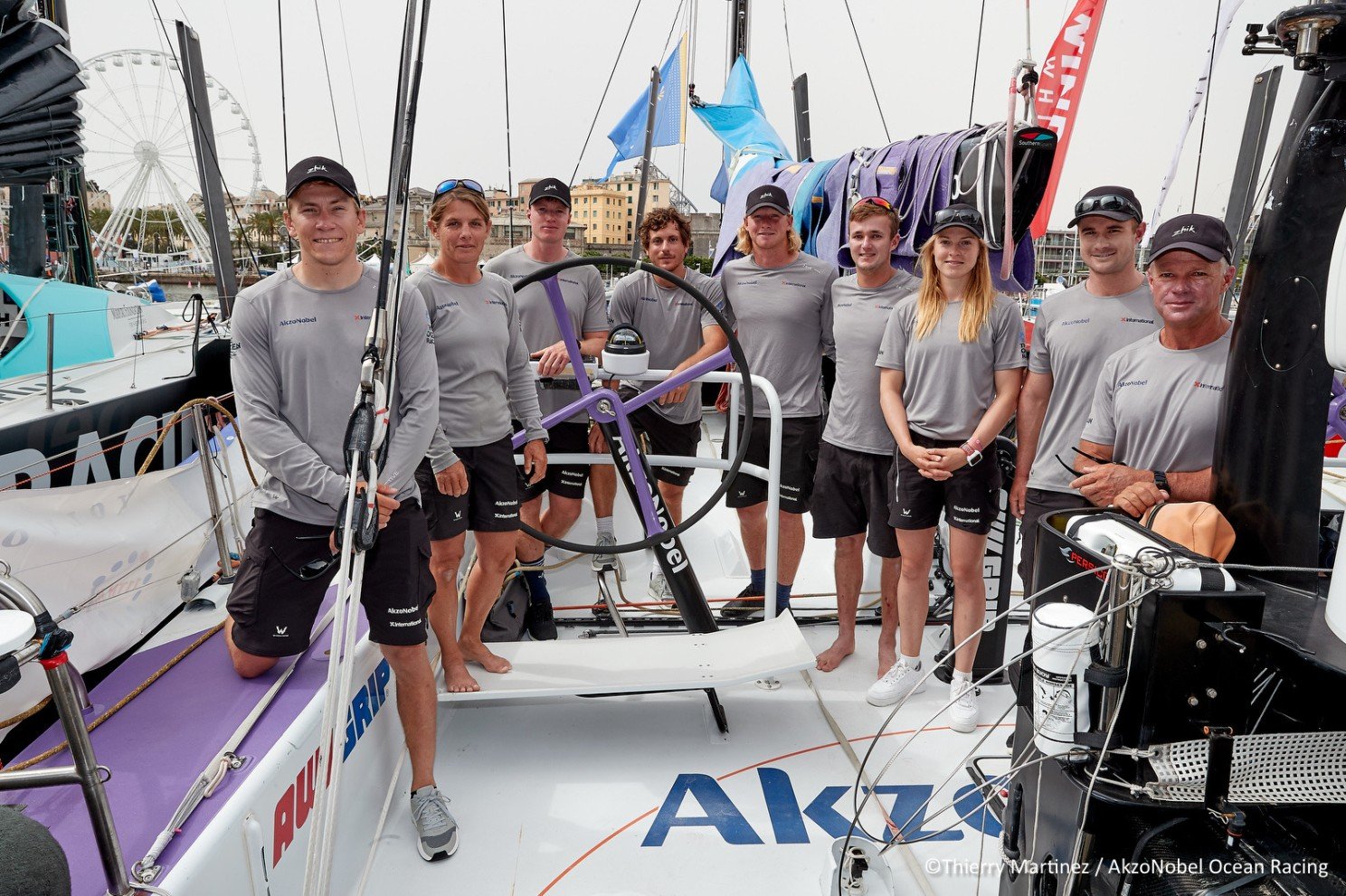The contrast between land and sea
Competing in The Ocean Race and being away from home and land made me realise the contrast between land and sea couldn’t be any bigger. I struggle often on land and I wanted to explore and open up about this idea and where it came from and the future journey to soon be running my own team and compete in Ocean races. I’ve learned a lot from my life at sea and take this with me throughout my entire life on land and sea.
Whenever I go offshore for a longer period, people often ask me: ‘How do you prepare for such a trip?’. There’s a common misconception that sailors must train intensely in the gym every day, much like Olympic athletes. While physical fitness is crucial, our preparation goes beyond being in peak physical condition. If we would, then we would be very strong but not at our best health. Us sailors don’t train for sprints, we train for endurance. Our goal is to be healthy and fit and to sustain performing for up to sometimes 40 or even 80 consecutive days, for example in the Véndee Globe. This endurance mindset sets us apart from many other sports, where athletes work towards a peak event and for us it works differently. Normally in topsport, the environment is monitored (nutrition, sleep, training, rest) and we don’t have that. As sailors, our environment is unpredictable, and we often find ourselves in survival situations. The only thing we can control is ourselves and the way we deal with challenges, both mentally and physically. One of the most important skills to have as a sailor is to understand your body and mind. Whenever you are able to keep both in balance during the most extreme conditions, you can do things that will amaze you and these experiences will get addictive. Therefore, our preparation is holistic, ensuring we're physically fit and mentally prepared to handle the unique challenges of life at sea.
What does being healthy mean to us sailors?
In the gym we train to prevent injuries and we do mobility training, making sure we are able to handle the waves’ impact. We need to be strong and have endurance, because we need to hoist sails, turn winches, work on the grinder etc. and with that we burn around 4000 calories on a daily basis, because we even burn a lot of calories while we sleep since the boat is always moving.
Whatever it is, the way you tell your story online can make all the difference.
We make sure we maintain a healthy gut. Falling ill onboard is a serious issue, as there isn’t much room to recover. The environment we are in is challenging and actually not so healthy at all. There is no access to fresh fruit or veggies, we are very tired most of the time, because of the lack of sleep. Sometimes when the conditions are pleasant, we have some time to catch up on some sleep, but true recovery usually only happens when we reach land at the end of a leg.
Being away at sea for 20 to 40 days requires strong mental resilience. On land, you have responsibilities that you carry with you while at sea, so it's crucial to ensure everything at home is in order. For me the most significant mental preparation involves maintaining healthy relationships at home. I feel completely empowered and the best version of myself at sea when I leave home on land with a feeling of knowing everyone at home will manage in the period I’ll be away again. The life I’m living is something not many people will choose to do and I consider myself lucky to be able to have this career path which I beam and dream off and maintain good relationships with both my partner, friends and family at the same time. Keeping this balance is something that costs constant energy and dedication from all parties. Managing expectations and unconditional love is something that keeps connecting us.
I've been dealing with chronic headaches for over ten years, but when I'm at sea, they fade away. On land, I follow strict routines—yoga, gym sessions, limiting alcohol, and maintaining a strict bedtime—to function well. If I don't live healthily, everything becomes too intense and I find myself drifting away until I lose myself. However, at sea, my headaches disappear. Over the years I’ve seen many specialists, yet no one could explain where it’s coming from and they refer to it as ‘tension headaches’. Last year during The Ocean Race I found the explanation myself. The longer I was out at sea, the less the pain got. Life on the water is free from the usual impulses and distractions. You focus on four things: sailing, eating, sleeping, and basic needs. Despite the harsh conditions, life is straightforward, and there are no external expectations since everyone knows you're sailing.
Life on land is full of complex impulses and distractions. Society’s expectations are sky-high: stay healthy, work out, look good, maintain a rich social life and build a successful career. Ths constant pressure leaves little time for personal reflection, because of the distractions from phones, advertisements and the overwhelming impulses. The demands of land life can be intense to me, making it hard to find peace and focus.
In contrast, life on a boat is far from comfortable but offers a peaceful and pure environment with more ‘me-time’. After spending over ten days at sea, it feels like a retreat, and you return with a quiet mind. My brother once said to me that after 36 days at sea, I came back calm and relaxed, not exhausted and overstimulated as he expected. The peacefulness of the sea leaves me more refreshed than 36 days on land, where I often feel rushed. This experience shows me the big contrast between the two worlds and reminds me to find more ways to relax and find peace on land.
Until two and half a year ago I had to deal with a sleeping disorder; often talking in my sleep and sleepwalking. In 2021, during my time at AkzoNobel Ocean Racing, Chris Nicholson told me: ‘You are talented, but the main thing stopping you from success in sailing is your sleeping problem, after I sleepwalked onto the deck. Him saying that made me go to therapy - specifically sleep hypnosis - and that helped me enormously. Now, I can hypnotise myself to sleep which makes me sleep better than ever and I no longer talk and walk in my sleep anymore.
I remember this one time at AkzoNobel during a delivery, I ran on deck in my pyjamas, panicking and shouting to the Danish Nicolai Sehested: ‘There is a cruise ship coming our way, we need to change course’. He then quickly checked the radar, but found nothing. At that moment I woke up startled and ashamed, so I rushed back to bed, realising that my sleeping disorder was a serious issue. It was clear I needed to be reliable and not endanger anyone, so I decided to start therapy sessions. That’s when I started doing the therapy sessions and it helped me overcome my disorder.
My current sleeping routine when I'm sailing involves listening to the same playlist on Spotify, called ‘Jazz Vibes’. This helps me fall asleep within seconds—just thinking about it makes me yawn ;). I use noise-cancelling AirPods or noise-cancelling headphones and this combination works very well for me.
From my experiences on sea and land, I've learned the value of living in the moment and reducing impulses. I thrive when I minimise distractions, preferring a quiet Friday night in and a good workout the next morning over a late night out. That's why I now live in a peaceful area near water, the beach, and the woods. I love being close to nature and appreciating its quietness. Crowded places, like big parties and even big supermarkets tend to overstimulate me, so I seek out calm environments where I feel most at ease.
I often talk about impulses, because sailing makes you skilled in recognizing these impulses. Two days before the land is visible, you can smell it and even hay fever and allergies may flare up. Each country has its unique scent - I strongly remember the tropical aroma of Brazil after over a month at sea. Approaching land you can see the lights when arriving by night and the mountains by day, followed by boats and fishermen. Suddenly your phone gets reception and it starts buzzing with messages. Shortly after that, when approaching the harbour, Stu - our boat captain and tower of strength - was always approaching the boat by rib and he was the first person you see and who gives you a hug when he steps on board. To me, this was always a very important and ‘secretly’ emotional moment, because it makes you realise the adventure is over once again. It’s time to step out of the bubble and to get ready for life on land, experience a culture shock, but also to surround yourself again with the people you love while you haven’t been allowing yourself to actually miss them. Coming back to the dock you see a whole crowd cheering for you with lights, scents, colours and a lot of sound. That is magical and a moment of pure bliss and you will experience this at its best if you allow yourself to lose the control you have been trying to keep so hard all along.. And before you even realise it, you are back into a different world.




